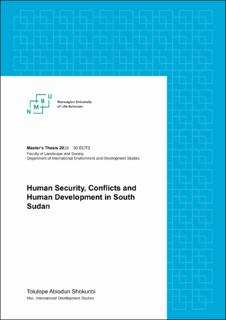| dc.contributor.advisor | Kjosavik, Darley | |
| dc.contributor.author | Shokunbi, Tolulope Abiodun | |
| dc.coverage.spatial | South Sudan | en_US |
| dc.date.accessioned | 2020-07-02T11:50:50Z | |
| dc.date.available | 2020-07-02T11:50:50Z | |
| dc.date.issued | 2019 | |
| dc.identifier.uri | https://hdl.handle.net/11250/2660510 | |
| dc.description.abstract | The essence of security is the protection of life and property both of which are important to human beings. However, without life or well-being of humans, property is useless. Human security involves the protection of human lives to enable people to enjoy freedom and fulfil their dreams. This study attempts to ascertain the dimensions of the socio-economic and political marginalisation experienced by different regions in South Sudan thereby explaining how this could have increased the threats to human security and reduced human development of the country. The study employs quantitative research methods by engaging in the analysis of two secondary datasets collected during the South Sudan household health survey in 2006 and 2010 in order to find out if the people of South Sudan are marginalized across regions/states/ethnic groups through the distribution of socio-economic welfare services like education and healthcare services. In addition, the study seeks to identify the dimensions of the threat to human security experienced by South Sudanese due to violent conflicts and the sources of threats to food security experienced by the people. Having agreed with the commission on human security’s idea that human security is the protection of the vital core of all human lives, the study explains marginalisation through the theoretical framework of marginality. Thus, it establishes that South Sudanese, since their days with their Northern counterparts have been experiencing systemic marginality which thrived on positional polarity created by the British colonialists. More so, the study finds that despite their independence, South Sudanese continuously suffer systemic marginality as well as constant threat to their human (in the dimension of economic, food, health, personal and political) security caused by unequal distribution of socio-economic welfare services and continuous violent conflict. | en_US |
| dc.language.iso | eng | en_US |
| dc.publisher | Norwegian University of Life Sciences, Ås | en_US |
| dc.rights | Navngivelse 4.0 Internasjonal | * |
| dc.rights.uri | http://creativecommons.org/licenses/by/4.0/deed.no | * |
| dc.title | Human security, conflicts and human development in South Sudan | en_US |
| dc.type | Master thesis | en_US |
| dc.description.version | submittedVersion | en_US |
| dc.subject.nsi | VDP::Samfunnsvitenskap: 200::Statsvitenskap og organisasjonsteori: 240::Internasjonal politikk: 243 | en_US |
| dc.description.localcode | M-DS | en_US |

